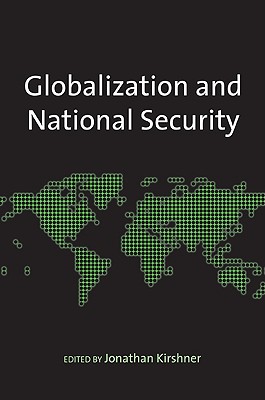

 Routledge
Routledge
Globalization and National Security


Key Metrics
- Jonathan Kirshner
- Routledge
- Paperback
- 9780415955119
- 8.98 X 6.1 X 0.77 inches
- 1.08 pounds
- Political Science > Security (National & International)
- English
 Secure Transaction
Secure TransactionBook Description
In this book, top scholars of international relations assess the consequences of globalization for national security, identifying three distinct 'processes' of globalization - the intensification of economic exchange, the flow of information, and marketization (the expansion of the set of social relations governed by market forces)-exploring how they can affect the capacity and power of states as well as conflict within and among them.
Though much has been written on the topics of globalization and national security, there has been relatively little in the way of a systematic examination of the impact that globalization has on a state's national security. These essays deal with how state-less actors, such as terrorists, utilize the benefits of globalization, changing the nature of the security game. Failure to account for the influence of globalization will make it increasingly difficult to understand changes in the balance of power, prospects for war, and strategic choices embraced by states.
Author Bio
Jonathan Kirshner is Professor of Political Science and International Studies. His research and teaching interests focus on international relations, political economy (especially macroeconomics and money), and politics and film. His current research includes projects on classical realism, the international political implications of the financial crisis and its aftermath, and the politics of mid-century cinema.
Prior to joining Boston College, Kirshner was the Stephen and Barbara Friedman Professor of International Political Economy in the Department of Government at Cornell University. At Cornell, he also served as director of the Reppy Institute for Peace and Conflict Studies from 2007 to 2015, and was the recipient of the Provost’s Award for Distinguished Scholarship and the Stephen and Margery Russell Distinguished Teaching Award.
Recent books include American Power after the Financial Crisis, and Hollywood’s Last Golden Age: Politics, Society and the Seventies Film in America. His first book, Currency and Coercion, explored how states manipulate international monetary relations to advance security-related goals. Another book, Appeasing Bankers: Financial Caution on the Road to War, illustrated how financial interests (such as banks) and international financial markets can shape and constrain states’ grand strategies and influence decisions about war and peace. Appeasing Bankers won the best book award from the International Security Studies Section of the International Studies Association.
Kirshner was the first World Politics Visiting Fellow at Princeton University’s Institute for International and Regional Studies, and was the director of the Economics and National Security Program at the Olin Institute at Harvard University from 2000-04. With Eric Helleiner, he is the co-editor of the multi-disciplinary book series “Cornell Studies in Money,” as well as the books The Great Wall of Money: Power and Politics in China’s International Monetary Relations and The Future of the Dollar.
Source: Boston College
Videos










Community reviews
Write a ReviewNo Community reviews